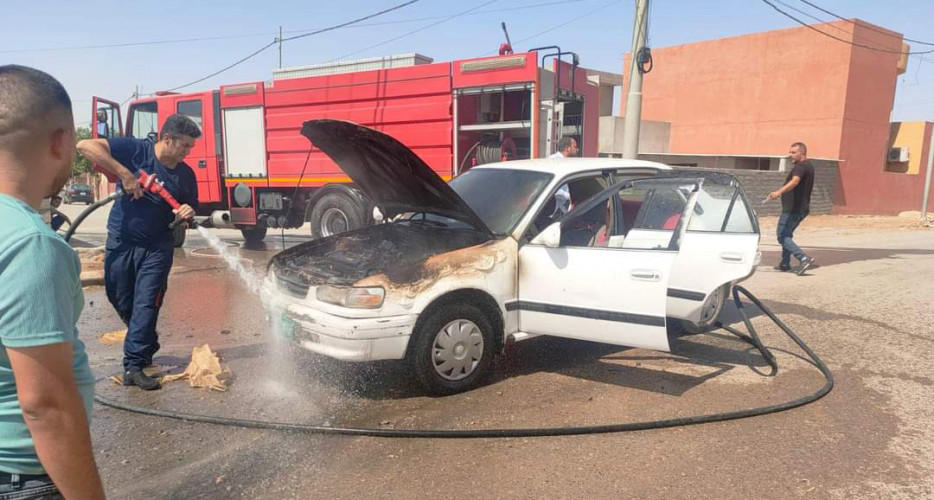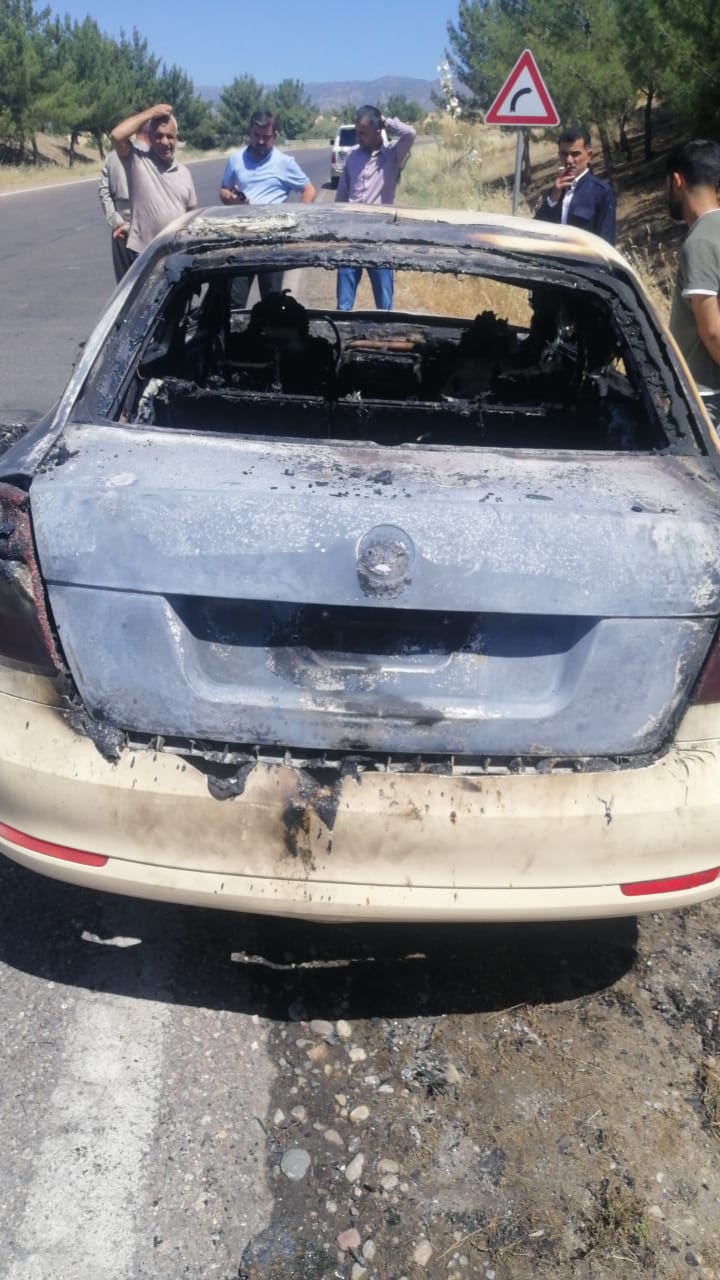
Peregraf– Amar Aziz
Poor-quality gasoline was the bane of Nawzad Ahmed’s taxi business. His car kept breaking down, forcing him to go to the mechanic. He spent hours waiting in line at the gas station queuing for subsidized fuel.
One day while driving his Skoda taxi between Duhok city and Qadsh, the engine began having problems again.
"I stopped on the side of the road, knowing that the gasoline I bought was very bad, and turned off my car. It caught fire after a few seconds," Ahmed told Peregraf.
He called the civil defense forces and friends in an attempt to extinguish the flames, but his car burned completely in a matter of minutes.
Two days earlier, he had filled the taxi’s gas tank with government-subsidized fuel sold for 690 Iraqi dinars ($0.47) per liter. He had waited in line for 13 hours for the chance to fill up.
Last year, the father of four bought the taxi for $9,200 (13.4 million Iraqi dinars) and began driving as a way to supplement his family’s income. He also works as government employee on contract, earning 350,000 Iraqi dinars ($240) per month, which is insufficient to meet the needs of his wife and children.
"100 percent the reason why my car caught fire was bad gasoline. The civil defense forces said the same thing," Ahmed explained.

Nawzad's car burned, June 15, 2022.
Ahmed Shingali, operator of a gas station in Duhok city, told Peregraf that, "in some cases, bad gasoline is a reason for cars catching fire, especially those with high air or pressure rates."
"But that is not sold at our petrol stations," he claimed.
Shingali said that there are other possible reasons why a car could catch fire other than poor-quality gasoline, like electrical shorts, but conceded that "it is better [for drivers] to use good gasoline."
According to data obtained by Peregraf, at least 144 cars have caught fire in Erbil and Duhok governorates since the start of 2022.
Bewar Abdulaziz, head of the Media Department of the Duhok Civil Defense Directorate, told Peregraf that 38 cars burned in Duhok governorate in the first six months of the year.
Major Sarkawt Karash, head of the media department of Erbil’s civil defense forces, said that 106 cars burned in Erbil through August 1.
Karash added that poor-quality fuel was to blame in 80 percent of cases that were investigated. He said that dangerous additives and contaminants are introduced during refining processes, which contribute to burning incidents.
Fires caused by poor-quality fuel can be extremely dangerous. On August 12, a fuel truck transporting local fuel in the Zakho administration caught fire. The driver died in the blaze, according to a local government statement.
Gasoline available, but at what cost?
In the Kurdistan Region, there is a variety of types of gasoline available to motorists, but a lack of oversight means that very little is certain about what is actually going into drivers’ gas tanks.
Private gas stations ostensibly sell three grades of gasoline that would be familiar to Western motorists: super for 1,450 Iraqi dinars ($0.99), a mid-grade known as muhassan for 1,325 Iraqi dinars ($0.91), and normal grade for 1,150 Iraqi dinars ($0.79).
The price of gasoline at private stations has increased significantly over the past year and a half. At the beginning of 2021, normal grade sold for just 500 Iraqi dinars ($0.34) per liter.
To mitigate this, the government offers two types of subsidized fuel that are sold during specific periods at designated gas stations.
In the first instance, Iraq’s federal government buyss fuel for the Kurdistan Region. This type is largely reserved for taxis and buses and sold for 690 Iraqi dinars ($0.47) per liter.
Sirwan Abdullah, head of the Erbil Provincial Gasoline Council, claimed to Peregraf that the quality of this type is "very high" and is produced by refineries owned by KAR Group, a conglomerate with close ties to the Kurdistan Democratic Party (KDP).
However, it is also this type of gas that Ahmed believes caused problems with his taxi, ultimately leading it to catch fire.
The Kurdistan Regional Government (KRG) also began selling gasoline as an emergency measure when normal-grade gas hit 1,300 Iraqi dinars ($0.89) per liter earlier this summer.
The quality of this type is widely distrusted by drivers because much of it is produced by local refineries that operate with little oversight and cause tremendous environmental damage.
According to the KRG’s Ministry of Natural Resources, the government buys 3 million liters of the locally produced gasoline per day for 1,200 Iraqi dinars ($0.82) per liter and subsidizes a third of that, at a cost to the public purse of 1.2 billion Iraqi dinars ($822,000). Two-thirds of this fuel supply goes to Erbil and Duhok governorates and the remainder to Sulaymaniyah and Halabja governorates.
"The government buys such gasoline from companies and it is true that the quality is not the same as the 690-dinar gas. Some merchants produce it and the government is forced to buy it," Abdullah said.
He added that staff at the Ministry of Natural Resources assured him that they were working to improve quality control and promised to reject any supplies that were not up to standard.
According to Erbil provincial administration statistics, 201 gas stations were sanctioned between June 1 and August 11 for selling poor-quality gasoline, with legal action allegedly taken against their owners.
All of this stands in comparison to federal Iraq, where gasoline sales are centrally controlled and fuel is sold to drivers at just 450 Iraqi dinars ($0.31) per liter.
Amid this complex system, proper oversight and enforcement of quality control is impossible, Sherko Jawdat, a member of the Energy and Natural Resources Committee in the Kurdistan Parliament, told Peregraf.
"All kinds of gasoline in the Region, despite as their names, are not accurate and correct. From super and muhassan to normal and the two other types that the government sells, basically they are all one gasoline, but mixed with other ingredients and sold to drivers," Jawdat claimed.
Despite their efforts, KRG officials are "not ready" to respond to parliament's demands for oversight, he added. According to the lawmaker, there is not a single, unified law covering gasoline quality and sales, but three separate laws, which causes confusion and impedes prosecutions.
"But we are not going to be able to do anything about it," Jawdat said.